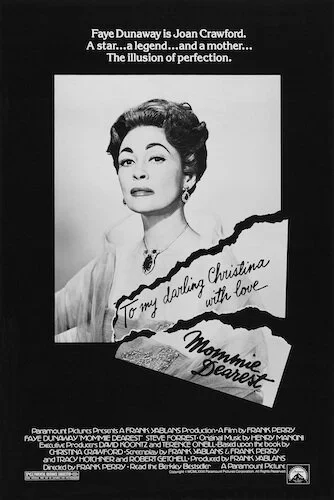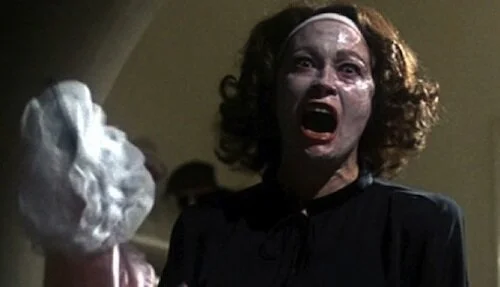Mommie Dearest: On-This-Day Thursday
Every Thursday, an older film released on this opening weekend years ago will be reviewed. They can be classics, or simply popular films that happened to be released to the world on the same date.
For September 18th, we are going to have a look at Mommie Dearest. It’s a little early, but not much has come out that’s noteworthy in early September, and this was an opportunity we couldn’t pass up on.
Oh dear.
It’s impossible to know where to start with Mommie Dearest: a cinematic effort at bringing up a memoir full of difficult conversations on domestic abuse to light (actress mega legend Joan Crawford being a monstrous mother, according to adopted daughter Christina Crawford), whilst trying to catch onto that new Oscar bait wave that was hitting the late ‘70s and early ‘80s. Well, this film failed on both fronts, turning a confessional into exploitation and Oscar bait into accidental hilarity. Acting more like a living display case of haunted mannequins, Mommie Dearest is so stiff while trying to be so edgy, that it truly is one of the more peculiar biopic experiences I’ve ever had. I don’t even know how to properly rate this film. It almost feels like the My Teenage Dream Ended of cinema (you know, that god awful Farrah Abraham album that’s so terrible that it becomes euphoric). In ways, it’s like witnessing a car crash happening with every element accidentally becoming a part of this crash. The dialogue is diabolical. The acting is insane. This film has “the bitter remains of New Hollywood” all over it.
It’s incredibly unfortunate, because in this New Hollywood casket is Faye Dunaway, who helped kick off the New Hollywood movement with Bonnie and Clyde, and carried on through it as a figurehead in films like Network and Chinatown. Here she is, right at the very end of an era, and her career similarly stopped right there and then as well. As a Dunaway fan, this film devastates me, because I would love if Dunaway was still kicking it with Jessica Lange, Meryl Streep, and other megastars of her time that are still working substantial roles. Dunaway deserves it. Instead, she’s done nonsense like Dunston Checks In, Cougar Club, and other films that have wasted her talent. Unfortunately, this is an instance where a performer hasn’t been guided properly, and Frank Perry didn’t know that Dunaway was going too far (when everyone else was trying to match her overacting, or they underacted in comparison). So, Mommie Dearest is a shouting match, with more teeth gritting than a chewing tobacco festival.
Still no wire hangars ever.
What really perplexes me is how Mommie Dearest is the result of too much going on behind the scenes in some ways. There are four (count them: four!) screenwriters, with a fifth writer in Christina Crawford’s original novel to consider. It took that many writers to come up with… this film… It doesn’t make any sense. How is dialogue this stilted and pacing this bad the result of too many cooks in the kitchen? This feels more like a new screenwriter trying to finish a story one hour before a pitch. This feels like the first draft. If the writing department did too much, then Perry did too little, and the performers did too much to over compensate. So, we have a stew of campiness, and its spices will burn you as much as its saltiness will give you whiplash.
Yet, watching Mommie Dearest in 2020 is beyond just an ironic experience. I usually rate films that are so bad that they’re good a 1 out of 5, but Mommie Dearest has a 2.5: right in the middle of mediocrity. How does that make any sense? Well, as out of place as the film was back in 1981, it almost feels like a blueprint for the American films of the ‘90s and onwards that cut right to the chase, enjoy embellishments, and live for corny danger. Someone like John Waters’ entire filmography (including Pink Flamingos) has been reassessed by the mainstream as gold (and it is gold, so don’t get me wrong there). Naturally, films as misguided as Mommie Dearest are falling into this same category; it’s no Polyester, but it still somehow finds a home in current pop culture. Clips online are beloved for all sorts of reasons. Lines are quoted out of pure infectious quality. I can’t even consider Mommie Dearest necessarily terrible anymore, because it’s so like many films I genuinely like, despite being so far from its mark. On that note, I love My Teenage Dream Ended in the same way people get hooked on Karen videos or other uncomfortable predicaments: sometimes, being in that area of complete disarray is a getaway. Mommie Dearest is just that: not good enough to compete with the good films like it, but so much more entertaining than the bad films like it. It can only be right in the middle of the scale. An intention so pure being this catastrophically bad exists in its own realm, to be frank.
Andreas Babiolakis has a Masters degree in Film and Photography Preservation and Collections Management from Ryerson University, as well as a Bachelors degree in Cinema Studies from York University. His favourite times of year are the Criterion Collection flash sales and the annual Toronto International Film Festival.






